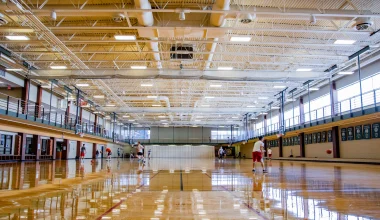Moving to a new address can bring about a lot of changes, including wondering if your TV license will still cover you. If you find yourself in this situation, you may be asking yourself, “Does my TV license cover me at another address?” It’s important to understand the rules and regulations surrounding TV licenses to ensure you are compliant and avoid any penalties or fines.
The TV licensing system can be confusing, especially when it comes to relocating to a new place. Many people assume that their TV license automatically transfers with them when they move, but this may not always be the case.
This article has been written to help you understand how your TV license works when you move to a new location. This will help you avoid any confusion or potential consequences.
Table of contents
What is a TV licence?
A TV license is a legal requirement in many countries that allows you to watch live television broadcasts or use streaming services on your television.
The revenue generated from TV licenses helps fund public broadcasting services, such as the BBC in the UK. It’s important to note that owning a TV does not automatically mean you need a TV license – it’s specifically for watching live broadcasts.
In some countries, the cost of a TV license can vary depending on factors like household income and whether additional devices are used to access television content.
It’s always best to check with your local government or broadcasting authority to understand the specific regulations around TV licenses in your area. Remember, staying informed about these requirements will help you avoid any potential fines or penalties for non-compliance.
Read: What is a Placement Year at University?
What is the cost of a TV license?
The cost of a TV license can vary depending on where you live. In the UK, for example, the current cost for a colour TV license is £157.50 per year, while a black and white TV license costs £53.00 per year.
These licenses are required if you watch or record live television broadcasts. Check with your local broadcasting authority to find out the specific cost in your area.
Having a TV license ensures that you are legally allowed to watch live TV programs and access online streaming services like BBC iPlayer. While it may seem like an additional expense, it helps fund public service broadcasting and supports the production of high-quality content.
Make sure to stay informed about the cost of a TV license in your region to avoid any penalties for watching television without one.
When Do I need a TV license?
You need a TV license if you watch or record live TV programs on any channel, including the BBC, ITV, Channel 4, Channel 5, and Sky.
You also need a TV license if you watch BBC iPlayer, whether on a TV, computer, tablet or mobile phone.
There are a few exceptions to the TV license rule. You do not need a TV license if you only watch:
- Freeview channels that are not broadcast live, such as Dave or Yesterday.
- On-demand programs that are not broadcast live, such as Netflix or Amazon Prime Video.
- TV programs that are streamed from outside the UK, such as on Hulu or Disney+.
Also Read: Best Head Boy Speech: A Student’s Top 10 Tips
Does my TV license cover me at another address?
Your TV license covers you at your main home address. If you move to another address, you will need to get a new TV license for that address. However, a TV license will cover you at another address if you only watch or record live TV or use BBC iPlayer there occasionally. This is known as “secondary viewing”.
However, if you watch or record live TV or use BBC iPlayer at the other address regularly, you will need a separate TV license for that address.
How do I know if I need a separate TV license?
There is no hard and fast rule for determining whether you need a separate TV license for another address. However, the following factors may indicate that you do need one:
- You watch or record live TV or use BBC iPlayer at the other address for more than 4 hours per week.
- You have a TV set at the other address.
- You stay at the other address for more than 30 days in a row.
If you are unsure whether you need a separate TV license, you can always contact TV Licensing for advice.
Related: Is Psychology A-Level Exams Hard: What Other A-Levels Go Well With A-Level Psychology?
Do I need a TV licence if I am a student?
If you are a student and you are watching or recording live TV at your home address, you will need a TV licence. This is the case even if you are only watching TV for a short period, such as during the holidays.
However, if you are studying away from home and you are not watching or recording live TV at your home address, you do not need a TV license. This is the case even if you are still registered at your home address.
What if I am a student living in halls of residence?
If you are a student living in halls of residence, you will usually only need one TV license for the whole building.
This is because it is assumed that all residents will be watching or recording live TV or using BBC iPlayer at the same time.
However, if you have your own TV set in your room, you may need to buy a separate TV license. You should check with your landlord or accommodation provider to find out their policy.
Read: How Many Words is a University Dissertation? | Dissertation Tips
What if I am a student living in a shared house?
As a student living in a shared house, you may not necessarily need a TV license if you only watch television on devices that are not connected to an aerial or cable service. This means that if you only stream shows and movies on your laptop or phone, you should be exempt from needing a TV license.
However, if your shared house has a TV that is connected to an aerial or cable service, then technically you would need a TV license to watch live broadcasts. It’s always best to check the specific regulations in your country or region to ensure compliance with the law.
It’s important to be aware of the rules regarding TV licenses in your area and make sure you are following them accordingly to avoid any potential fines or penalties.
What if I am only staying at another address temporarily?
No, you do not need a TV license if you are staying at another address temporarily. TV licenses are typically required for households where television is being watched or recorded as it is being broadcast.
If you are only staying at another address for a short period and not using the television services there, then you should not be required to obtain a TV license. However, it’s always a good idea to double-check with the local regulations just to be sure.
If you find yourself in a situation where you are unsure about the TV licensing requirements, I recommend reaching out to the relevant authorities or checking their official website for more information.
It’s better to be informed and avoid any potential fines or penalties that may arise from not having the necessary license. Enjoy your temporary stay without worrying about TV licensing!
How can I get a TV license?
Getting a TV license is quite simple. In most countries, you can easily apply for a TV license online through the official government website.
You will need to provide some basic information, such as your name, address, and contact details. Once your application is processed and approved, you will receive your TV license either electronically or by mail.
Having a TV license is important as it ensures that you are legally allowed to watch live television broadcasts in your country. It also helps fund public broadcasting services that provide valuable content for viewers.
So, if you don’t already have a TV license, take a few minutes to apply online and enjoy watching your favourite shows, knowing you are doing so legally.
Related: Is University Higher Education or Further Education in UK?
FAQs on Does My TV Licence Cover Me at Another Address?
If you are caught watching or recording live TV or using BBC iPlayer without a TV licence, you could be fined up to £1,000.
Yes, you can get a refund on your TV licence if you no longer need it. You can do this by contacting TV Licensing.
You can renew your TV licence online, over the phone, or by post.
You can find more information about TV licenses on the TV Licensing website: https://www.tvlicensing.co.uk/
Conclusion
It’s important to clarify whether your TV license covers you at another address to avoid any potential legal issues.
While the rules may vary depending on your location and circumstances, contacting your TV licensing authority or checking their website can provide you with the necessary information.
Remember that staying informed about the terms of your TV license can help you enjoy your favorite shows without any worries.
So, take a moment to reach out and ensure that you’re covered wherever you may be watching TV.
References
- TV Licensing website: tv licensing
- BBC website: bbc
- Ofcom website: ofcom



